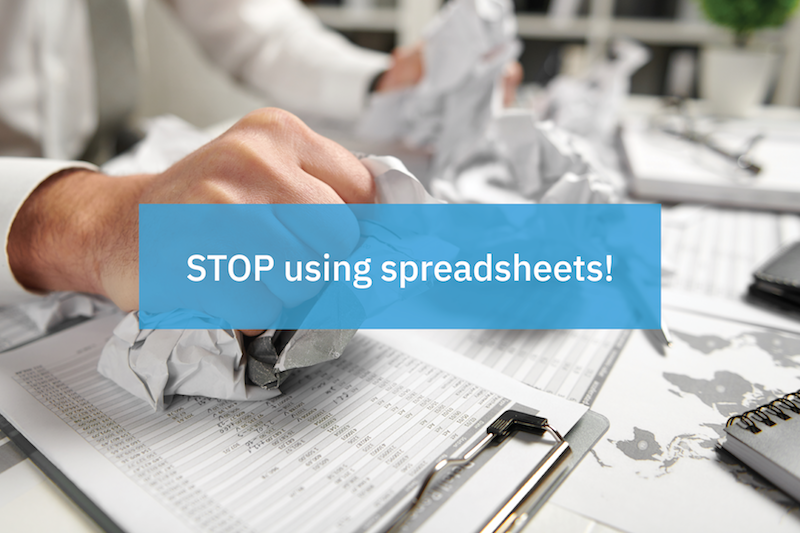
When one mentions data and information, the thought of using spreadsheets often comes to mind. But should they? Certainly not for accounting. Here are the top 5 reasons why you shouldn’t use spreadsheets for accounting.

Using Spreadsheets for Accounting is Risky
Spreadsheets can be a powerful tool for consolidating large amounts of data in an organized and highly visual way. But, using spreadsheets can be time-consuming and very risky, especially for accounting data. The likelihood of critical errors and other core issues makes spreadsheets both impractical and ineffective for financial management. With cloud-based accounting solutions like Accounting Seed, you don’t need to deal with spreadsheet pain points anymore. Let’s examine these pain points below.
Top 5 Reasons Not to Use Spreadsheets
Spreadsheets can be useful for organizing financial data when a company first starts out. However, this becomes arduous when the accounting grows more complex. Scalability is very difficult with spreadsheets because of the work that must be done to update it. This opens a gateway for higher-level problems. Here are five reasons why you should just avoid using spreadsheets.
1. Time and labor
Even with formulas, spreadsheets take a process and a keen eye to manage. In spreadsheets, people must enter, re-enter, validate, and correct data manually. This requires a lot more time than simply scheduling an automated report and viewing the data. It’s also a frustrating process for staff.
2. Critical errors
Spreadsheets have a strong tendency to allow accounting errors. This happens when staff must work within cells and constantly update accounts. Correcting errors often involves tedious looking for the accounting data in question and manually correcting it. Formatting issues can lead to both qualitative and quantitative data problems that can have serious financial repercussions.
*One example is when Excel flaws and incorrect testing resulted in JP Morgan Chase losing more than $6B. Due to having to use manual copy and paste functions from one spreadsheet to another causing high-level data errors. You can see more stories like this here.
3. No automation
One of the reasons spreadsheets fall to financial errors is their lack of automation. The time spent manually updating and monitoring spreadsheets can leave inconsistencies in the system. Missing one correction or not updating a single formula will leave the data flawed. There is no functionality to update relevant account information, or rules in place to moderate the kind of data entered. However, automation in accounting solutions updates your data in real-time. Systems like Accounting Seed also automate notifications and requirements for entering data to ensure accuracy.
4. Security flaws
Spreadsheets are notoriously unsecure. Anyone who gets access to the spreadsheet, has complete access to your accounting information. There are no passwords, internal controls, or user rules preventing people from viewing, stealing, or altering accounting data. Data breach is not only costly, it can also end your business. Make sure your accounting system has internal and external safeguards in place.
5. Compliance complications
Organizations beholden to regulations like Defense Contract Audit Agency (DCAA) or U.K.’s Make Tax Digital (MTD), spreadsheets create problems. Besides accounting errors and difficulty isolating precise data, spreadsheets are hard to track. This often causes further delays and issues during audits. For example, DCAA compliance requires a full history of who edited a record and who granted permission to do so. Spreadsheets don’t offer these features, its accessibility can’t really be controlled.
Additionally, MTD businesses must have a solution that will “generate sales invoices or link electronically to the package which does this for you.” Spreadsheets and most spreadsheet programs don’t do this. To comply, you’ll have to do extra work to enter accounting and tax data from a spreadsheet into a digital system.
Why not just use a digital accounting system to begin with?
5 Reasons to Use Accounting Seed, Not Spreadsheets
All of these five reasons make spreadsheets unintuitive for financial management and difficult to manage. Why put your staff through this when you can have an easier, better accounting experience? One of the core objectives behind Accounting Seed’s design is to get you off spreadsheets! We want you to spend less time entering and managing the numbers and more time using them. Here’s how we beat spreadsheets.
1. User-friendly
Completely cloud-based, you can access your accounting anywhere and anytime. Accounting Seed focuses on providing a platform that provides an easy accounting experience by securely consolidating your accounting information in a single space. Making an adjustment is simply updated throughout the entire system. Our ease of use features have really served our customers and earned Accounting Seed several awards.
2. High-level automation
Automation is essential for faster, easier, more reliable accounting. That’s why this is one of the central design elements of Accounting Seed. Anything you can put to logic, we can automate. No more manual data re-entry or calculations. Access data and perform accounting operations like billing with just a click. Whatever you put to logic we can automate. Accounting Seed is also equipped with event, batch and scheduled, job automation.
3. Customizable
Whether you need to meet compliance regulations, or just want to make your workflow easier, flexible accounting technology is key. Accounting Seed is the most customizable accounting platform in the world. From internal controls to custom reporting and calculations, to defining your unique processes Accounting Seed runs your accounting your way.
4. Intuitive and visible
Any updates and transactions can be seen and accessed in real-time. Our highly visual and customizable interfaces let you dictate how you view data. Organize and pinpoint the information you need with custom reporting and dashboards. Team members with access can view accounting details and collaborate to make the best decisions possible.
5. Highly secure
Accounting Seed offers the strongest, most reliable API in the industry, Open API. This ensures that Accounting Seed’s connection to other Salesforce-based tools is robust, as well as those outside of the Salesforce ecosystem. Accounting Seed is equipped with secure Salesforce architecture and offers internal and external security features right out-of-the-box.
See Accounting Seed in action
Get a close-up view of how accounting on Salesforce can eliminate the need for costly integrations—and silos of mismatched information—by sharing the same database as your CRM.



